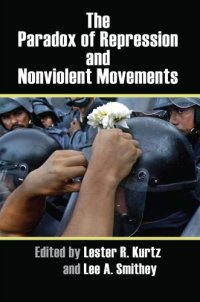
Ebook: The Paradox of Repression and Nonviolent Movements
- Series: Syracuse Studies on Peace and Conflict Resolution
- Year: 2018
- Publisher: Syracuse University Press
- Language: English
- pdf
Political repression often paradoxically fuels popular movements rather than undermining resistance. When authorities respond to strategic nonviolent action with intimidation, coercion, and violence, they often undercut their own legitimacy, precipitating significant reforms or even governmental overthrow. Brutal repression of a movement is often a turning point in its history: Bloody Sunday in the March to Selma led to the passage of civil rights legislation by the US Congress, and the Amritsar Massacre in India showed the world the injustice of the British Empire's use of force in maintaining control over its colonies. Activists in a wide range of movements have engaged in nonviolent strategies of repression management that can raise the likelihood that repression will cost those who use it. The Paradox of Repression and Nonviolent Movements brings scholars and activists together to address multiple dimensions and significant cases of this phenomenon, including the relational nature of nonviolent struggle and the cultural terrain on which it takes place, the psychological costs for agents of repression, and the importance of participation, creativity, and overcoming fear, whether in the streets or online.
Lester R. Kurtz is professor of sociology at George Mason University. He is the editor of the three-volume Encyclopedia of Violence, Peace and Conflict. Lee A. Smithey is associate professor of sociology at Swarthmore College. He is the author of Unionists, Loyalists, and Conflict Transformation in Northern Ireland.
Lester R. Kurtz is professor of sociology at George Mason University. He is the editor of the three-volume Encyclopedia of Violence, Peace and Conflict. Lee A. Smithey is associate professor of sociology at Swarthmore College. He is the author of Unionists, Loyalists, and Conflict Transformation in Northern Ireland.
Download the book The Paradox of Repression and Nonviolent Movements for free or read online
Continue reading on any device:

Last viewed books
Related books
{related-news}
Comments (0)